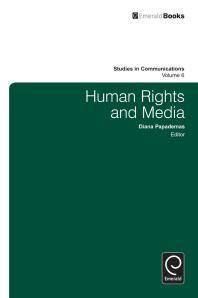Journalism & Digital Media
Resources
Background information on human rights: definitions, examples, and research from human rights organizations, agencies, and researchers
-
Human Rights Research and Education CentreUniversity of Ottawa. Look under the "Partnerships" tab to find people working on relevant topics at agencies, departments and universities in Canada.
-
Oxford Reference LibraryA collection of subject-specific, academic encyclopedias, dictionaries and handbooks. Excellent source of background, context, history and key concepts related to human rights from a variety of perspectives.Includes subscription titles via Oxford Reference Online Premium subscription collection as well as access to individual reference titles purchased perpetually.
Examples of reporting on human rights and related topics
-
News Research Guide at MRULinks to news database, digital archives, and historical newspapers
-
Alternative Press Index & ArchiveA bibliographic database of journal, newspaper, and magazine articles from international alternative, radical, and left periodicals.
Academic Journals
-
Journal of Human Rights PracticeThe main academic journal focusing on human rights practice and activism. Covers all aspects of human rights activism, spanning professional and geographical boundaries.
-
Human Rights QuarterlyProvides up-to-date information on important developments within the United Nations and regional human rights organizations, both governmental and non-governmental. It presents current work in human rights research and policy analysis, reviews of related books, and philosophical essays probing the fundamental nature of human rights as defined by the Universal Declaration of Human Rights.
-
Journal of Human RightsSeeks to broaden the study of human rights by fostering the critical re-examination of existing approaches to human rights, as well as developing new perspectives on the theory and practice of human rights.
-
Reference Sources on Human RightsBrowse this list of reference articles from a variety of academic disciplines to learn how human rights are discussed and defined in different contexts.
To find additional academic research on topics related to human rights, try searching in these databases:
-
JSTOR Collection
Digital library of academic journals, ebooks and primary sources. Includes content across the humanities, social sciences, and sciences.
Note: Use the JSTOR platform for access to Primary Source collections including 19th Century British Pamphlets, Struggles for Freedom: Southern Africa, World Heritage Sites: Africa, and Global Plants and are not available for inclusion in LibrarySearch primary sources search.
Find out more about indexing of these resources: https://support-jstor-org.libproxy.mtroyal.ca/hc/en-us/articles/5322416293399-JSTOR-ProQuest-Ex-Libris-Discovery-Resources -
ScienceDirect
Contains full text journal content in the areas of social & behavioral sciences, health & life sciences, and physical sciences.
-
Taylor & Francis Library
Provides full-text access to over journals in the fields of social sciences, humanities, science and technology.
Some starting points for finding stats and data on human rights related issues such as health, education, indigenous peoples, status of women and children, environment, poverty, etc.
Find more on the Library Statistics and Data research guide.
Books in the Library
Encyclopedia of Human Rights
Five-volume encyclopedia offers comprehensive coverage of all aspects of human rights theory, practice, law, and history. The set will provide situation profiles and full coverage of the development of the movement, historical cases of abuse, the key figures, major organizations, and a range of other issues in economics, government, religion, and journalism that touch on human rights theory and practice.
Reporting Human Rights, Conflicts, and Peacebuilding: Critical and Global Perspectives
This book focuses on the reporting of human rights in broadly defined times of conflict. It brings together scholarly and professional perspectives on the role of the media in constructing human rights and peacebuilding options in conflict and post-conflict environments. The chapters embrace a variety of theoretical, empirical and methodological approaches and will benefit students, scholars and media professionals alike.
Visualising Human Rights
Images are a crucial way of disseminating ideas, creating a sense of proximity between peoples across the globe, and reinforcing notions of a shared humanity. Yet visual culture can also define boundaries between people, supporting perceived hierarchies of race, gender, and culture, and justifying arguments for conquest and oppression. Visualising Human Rights is about the diverse ways that visual images have been used to define, contest, or argue on behalf of human rights. It brings together leading scholars to examine visual practices surrounding human rights around the globe.
Human Rights Journalism
Shaw argues that journalism should focus on deconstructing the underlying structural and cultural causes of political violence such as poverty, famine and human trafficking, and play a proactive (preventative), rather than reactive (prescriptive) role in humanitarian intervention.
Media, Mobilization, and Human Rights
What impact do mass media portrayals of atrocities have on activism? Why do these news stories sometimes mobilize people, while at other times they are met with indifference? Do different forms of media have greater or lesser impacts on mobilization? The book offers an array of case studies. By examining a variety of media forms, from television and radio to social networking, the interdisciplinary set of authors present radical new ways of thinking about the intersection of media portrayals of human suffering and activist responses to them.

Human Rights and Media
Introduces and analyzes the significant relationship and discourse of human rights and media. As agenda setters, framers and integral actors in human rights movements, various forms of media are analyzed by the contributing authors. News media, the press, television, cinema, photojournalism, the internet and other documentary forms are among the media investigated by the authors. Civil society dialogue, the rhetoric and ideology of human rights, the propaganda and media responsibility around such themes as war, genocide, ethnic division, nationalism, race, gender, child labor and disability are human rights themes addressed in this volume.
